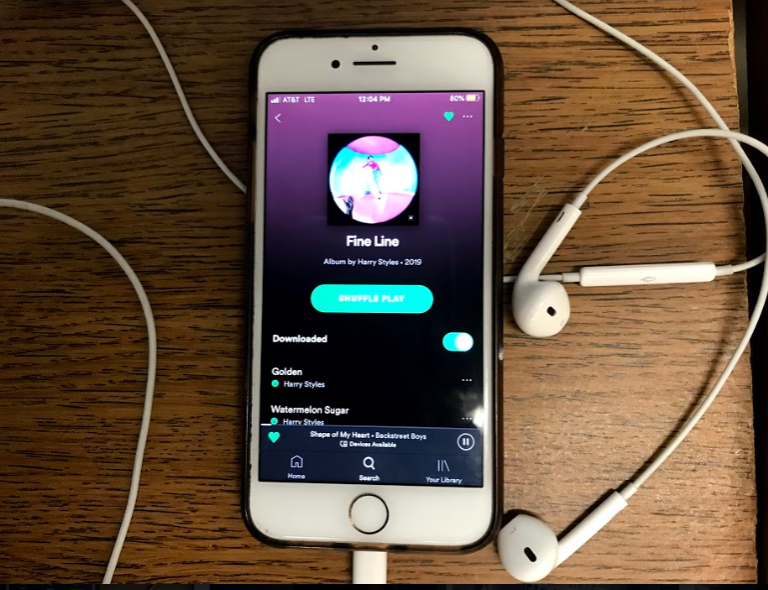Harry Styles walks the ‘Fine Line’ between finding his sound and evolving as a singer
Former One Direction member Harry Styles releases psychedelic pop album entitled “Fine Line.”
On Dec. 13, 2019, Harry Styles released his second solo album, entitled “Fine Line.” Following his classic rock and roll infused debut album “Harry Styles” in 2017, “Fine Line” seems to be the first step in Styles finding his own musical niche. While still incorporating the blues, rock and roll and electric sounds of his first album, experimental tracks on “Fine Line” are the most charming, and most exciting, for those of us closely following the teen heartthrob turned 1970’s rockstar’s career trajectory.
While Styles had prefaced the album by saying it was much darker and more depressing than his first, I was surprised to hear the chasm of difference between many of “Fine Line’s standout songs and his previous works. Where “Harry Styles” is heavy, loud and fast-paced, “Fine Line” is smooth, dreamlike in its whimsicality, indelibly psychedelic pop in nature.
I had expected blues-like tracks such as “Cherry” and classic rock “Canyon Moon,” but even those songs surprised me. Breakup ballad “Cherry,” featuring a recording of Styles ex-girlfriend speaking at the end, incorporates different portions of the recording in the background of the song. This incorporation gives a haunting quality to the song, a disillusionment that seeps into the bones of the listener.
Don’t you call him “baby”/ We’re not talking lately/ Don’t you call him what you used to call me/ I, I just miss/ I just miss your accent and your friends/ Did you know I still talk to them?
Of the entire album, “Watermelon Sugar,” “Adore You,” “Lights Up” and “Treat People with Kindness” are the most upbeat. Styles raspy voice is put to good use as it pours over funky horns and guitar riffs, expanding into unchartered territory with modern electronic basslines in the background. Catchy, provocative and fluid, the lyrics of each song are unique in their variations but united in their captivation of the listener.
“Falling,” and “Fine Line” are undoubtedly tinged with a sadness that is profoundly felt in each chord and note. These songs are slower, flowing like honey through the speakers. Styles’s voice lacks the raw energy of his classic rock attempts, opting instead for a melancholy sound that is more vulnerable and personal.
My personal favorites walked the line between slow and fast, old and new for Styles as a singer. “To Be So Lonely,” “She” and “Sunflower, Vol. 6” were unlike anything I expected. Deep reverberations of the synth in “Sunflower Vol. 6,” the natural jam session feel of “She” and the buildup of guitar strings in “To Be So Lonely” are new avenues of sound for Styles that I felt reflected his potential more so than the rest of the tracks.
These three tracks were the most experimental on the album, taking the cake for their clear place in the evolution of Harry Styles as a singer, musician, performer and writer. Each song seems to be a different costume for Styles, a new potential sound, a new potential persona.
Yet he never lands on just one costume, one sound, or one persona. If he let us in a little more, though, I could see Styles finally finding his sound once and for all.
While this album is clearly a step in the right direction, an irrevocable stop in the whimsical musical adventure that is Styles finding his sound, I felt that Styles only abandoned himself to a certain extent. I wanted more vulnerability, more innate character to his prolific writings, and while there is some intrapersonal communication between Styles and the listener, I think there is still a fear of total and complete abandonment on his end that causes that piece that is undoubtedly Harry to be missing from his music.
The most touching, impactful and insightful music- the very same music that inspires Styles- such as that of David Bowie or Fleetwood Mac is intrinsically individual, seeped in that raw honesty and an unshakeable sense of self which elevates them beyond the ranks of boyband hits. In order for Styles to fully make the jump beyond former teen heartthrob to legitimate rockstar, all walls have to come down. In “Fine Line,” I see cracks in the foundation, but no more.
While it’s easier said than done, especially for someone who grew up in perpetual spotlights and media scrutiny, I see a promising future for Styles if he can find the “Fine Line” between privacy and total abandonment and honesty within his music.
This album is still a step in the right direction, which is why I give it 8/10 stars. If Styles can work on infusing more of himself, and only himself, into his music to the fullest extent, then his future works hold promise as some of the most poignant of the next decade in music.


